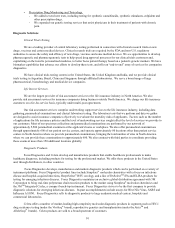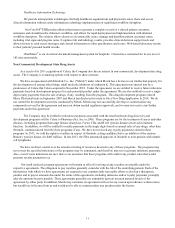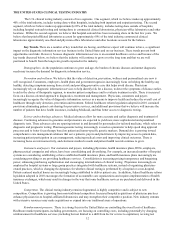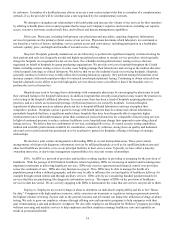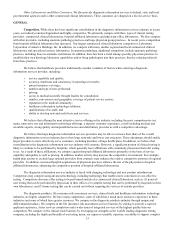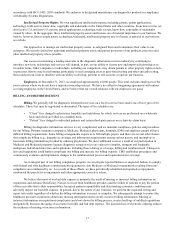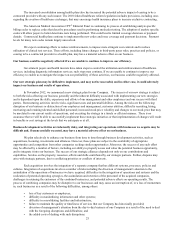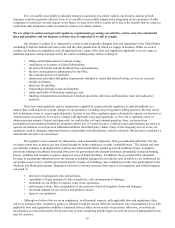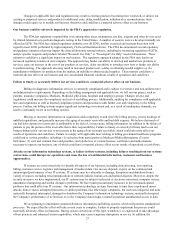Quest Diagnostics 2013 Annual Report Download - page 23
Download and view the complete annual report
Please find page 23 of the 2013 Quest Diagnostics annual report below. You can navigate through the pages in the report by either clicking on the pages listed below, or by using the keyword search tool below to find specific information within the annual report.19
CLIA and State Clinical Laboratory Licensing. All of our laboratories and, where applicable, patient service
centers, are licensed and accredited as required by the appropriate federal and state agencies. CLIA regulates virtually all
clinical laboratories by requiring that they be certified by the federal government and comply with various technical,
operational, personnel and quality requirements intended to ensure that the services provided are accurate, reliable and timely.
The cost of CLIA compliance makes it cost prohibitive for many physicians to operate clinical laboratories in their offices.
CLIA does not preempt state laws that are more stringent than federal law. State laws may require additional personnel
qualifications, quality control, record maintenance and/or proficiency testing. State laws also may require detailed review of
our scientific validations and technical procedures for tests.
Fraud and Abuse. Federal anti-kickback laws and regulations prohibit making payments or furnishing other benefits
to influence the referral of tests billed to Medicare, Medicaid or certain other federal or state healthcare programs. The penalties
for violation of these laws and regulations may include monetary fines, criminal and civil penalties and/or suspension or
exclusion from participation in Medicare, Medicaid and other federal healthcare programs. Several states have similar laws.
In addition, federal and state anti-self-referral laws generally prohibit Medicare and Medicaid payments for clinical
tests referred by physicians who have a personal investment in, or a compensation arrangement with, the testing laboratory.
Some states also have similar laws that are not limited to Medicare and Medicaid referrals and could also affect investment and
compensation arrangements with physicians.
FDA. The FDA has regulatory responsibility over, among other areas, instruments, test kits, reagents and other
devices used by clinical laboratories to perform diagnostic testing in the United States. The FDA also regulates clinical trials
(and, therefore, may conduct inspections related to testing that we perform for sponsors of those trials), drugs-of-abuse testing
for employers, testing for blood bank purposes and testing of donors of human cells for purposes such as in vitro fertilization. A
number of esoteric tests we develop internally are offered as LDTs. The FDA has claimed regulatory authority over all LDTs,
but has exercised enforcement discretion with regard to most LDTs performed by high complexity CLIA-certified laboratories.
The FDA has announced several regulatory and guidance initiatives that may impact the clinical laboratory testing business,
including by increasing regulation of LDTs, analyte specific reagents and products labeled "Research Use Only" or "Investigate
Use Only" used in laboratories. These initiatives could have a significant impact on our business. The regulatory approach
adopted by the FDA may lead to an increased regulatory burden on our Company. The approach may hinder our ability to
develop and market new products or services, cause an increase in the cost of our products or services, delay our ability to
introduce new tests or hinder our ability to perform testing. The approach also may result in increased product cost, a delay in
obtaining needed supplies or, if a manufacturer withdraws its products from the market, an inability to obtain needed supplies.
These matters could have a material adverse effect on our business and our consolidated financial condition, results of
operations and cash flows.
Our diagnostic products businesses are subject to regulation by the FDA, as well as by foreign governmental agencies,
including countries within the European Union who have adopted the Directive on In Vitro Diagnostic Medical Devices
(“IVDD”). These agencies enforce laws and regulations that govern the development, testing, manufacturing, labeling,
advertising, marketing, distribution and post-market surveillance of diagnostic products. Prior to commercially marketing or
selling most diagnostic products in the United States, we are required to secure clearance or approval from the FDA. Similarly,
we may need to obtain a license or certification such as a CE mark (obtainable where the manufacturer certifies that the device
conforms to the regulatory and quality requirements for the device) in order to sell diagnostic products outside of the United
States. Compliance with the IVDD allows us to market in Europe once we obtain a CE mark. Following the introduction of a
diagnostic product into the market, the FDA and non-U.S. agencies engage in periodic inspections and reviews of the
manufacturing processes and product performance. Compliance with these regulatory controls can affect the time and cost
associated with the development, introduction and continued availability of new products. These agencies possess the authority
to take various administrative and legal actions against us for non-compliance, such as fines, product suspensions, submission
of warning letters, recalls, product seizures, injunctions and other civil and criminal sanctions.
Environmental, Health and Safety. We are subject to laws and regulations related to the protection of the
environment, the health and safety of employees and the handling, transportation and disposal of medical specimens, infectious
and hazardous waste and radioactive materials. For example, the U.S. Occupational Safety and Health Administration
(“OSHA”) has established extensive requirements relating specifically to workplace safety for healthcare employers in the U.S.
This includes requirements to develop and implement multi-faceted programs to protect workers from exposure to blood-borne
pathogens, such as HIV and hepatitis B and C, including preventing or minimizing any exposure through needle stick injuries.
For purposes of transportation, some biological materials and laboratory supplies are classified as hazardous materials and are
subject to regulation by one or more of the following agencies: the U.S. Department of Transportation, the U.S. Public Health
Service, the U.S. Postal Service and the International Air Transport Association. We generally use third-party vendors to



